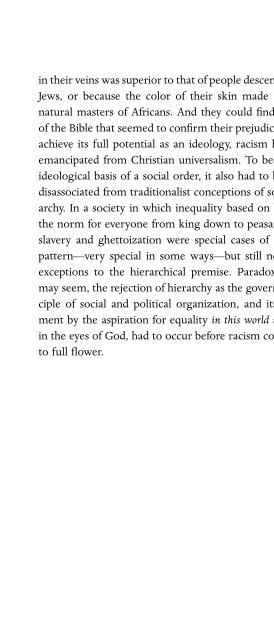Racism - A Short History - George M Fredrickson.pdf - WNLibrary
Racism - A Short History - George M Fredrickson.pdf - WNLibrary
Racism - A Short History - George M Fredrickson.pdf - WNLibrary
You also want an ePaper? Increase the reach of your titles
YUMPU automatically turns print PDFs into web optimized ePapers that Google loves.
THREE Climax and Retreat<br />
internationally acceptable conduct. The emergence of racism<br />
as a central human rights issue during the course of the<br />
century resulted mainly from the attention paid to these<br />
regimes by people beyond their borders. Their rise and fall<br />
were major events, not only in the history of these countries<br />
themselves, but also in the history of the world. They<br />
should not therefore be considered or compared in isolation<br />
but only in the international contexts that first influenced<br />
their emergence and then contributed to their demise.<br />
The story of racism in the twentieth century is one<br />
story with several subplots rather than merely a collection<br />
of tales that share a common theme.<br />
As has been suggested, modernization or “becoming<br />
modern” was a precondition for the overtly racist regimes.<br />
Traditional face-to-face hierarchies of an informal or “paternalist”<br />
sort, such as those that were found in black-white<br />
relations in the rural South and South Africa of the premodern<br />
era, could not be sustained in the urban and industrial<br />
environments of the twentieth century. The maintenance<br />
of white supremacy now required rules and regulations to<br />
prevent blacks from taking advantage of the absence of personalized<br />
surveillance and thereby getting “out of their<br />
place.” 9 Similarly, the premodern European pattern of communal<br />
separation between Jews and gentiles, with contacts<br />
limited primarily to economic transactions, did not suffice<br />
to maintain an ethnic status order based on religion and<br />
ancestry in a age of heavy industry, big cities, increased<br />
social and economic mobility, and the consolidation of nation-states.<br />
The norm of common citizenship and equal<br />
rights in modern nation-states could turn strong prejudices<br />
into systematic exclusions of a kind that could be justified<br />
104
















